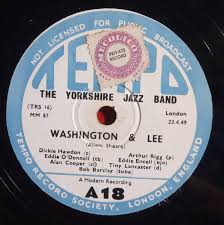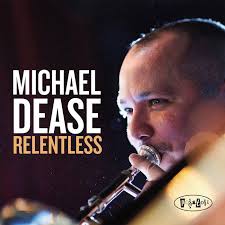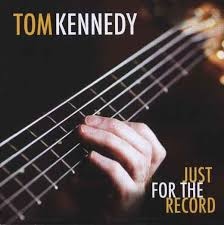
Daily Dose Of Jazz…
Richard Hawdon was born in Leeds, England on August 27, 1927 and first studied cello before moving to trumpet in his mid-teens. After a stint with the Yorkshire Jazz Band he relocated to London, England in 1951, signing on with Chris Barber’s famed New Orleans Jazz Band.
Hawdon replaced trumpeter Ken Colyer in the Christie Brothers Stompers in 1952, remaining with the group for close to two years. While his Louis Armstrong-inspired approach earned favor among traditional jazz purists, he developed a modernist sensibility influenced by Clifford Brown.
Bop and progressive jazz followed in 1954 as a member of Don Rendell’s group in addition to a stint as trumpeter and arranger with Tubby Hayes. He joined his first big band in mid-1956 with Basil and Ivor Kirchin and the next year he joined John Dankworth in 1957. This would be his longest and most rewarding career collaboration.
Beyond recordings with Dankworth, the group performed with Louis Armstrong, teamed with the Duke Ellington Orchestra, he wrote and arranged a number of Dankworth staples including Cool Kate and One for Janet. Hawdon went on to freelance with bandleaders Sid Phillips, Harry Gold, Oscar Rabin, Terry Lightfoot, and backed singers Tony Bennett and Eartha Kitt during a stint with the house band at the London cabaret Talk of the Town.
On the eve of the demise of jazz as the leading music of the era, Dick relocated to Yorkshire, England in 1967 and led the Batley Variety Club’s house band. A year later, he developed a jazz course at the new City of Leeds College of Music, and became head of the school’s Light Music Department in 1972. Hawdon also led his own jazz quintet throughout the 1980s, and after retiring from academia in 1993 he turned his attention to the bass, playing in a series of local groups.
Trumpeter and bassist Dick Hawdon died June 24, 2009.
More Posts: bandleader,bass,history,instrumental,jazz,music,trumpet

THE HEADHUNTERS
The current band consists of a top notch quintet with Clark, Summers and Harrison joined by bassist Chris Severin (Dr. John, Diana Krall, The Neville Brothers) and pianist Kyle Roussel (Preservation Hall Jazz Band), both staples on the New Orleans music scene. Managed by Greg Lucas and Craig Walker at Devil Hills Entertainment, the band is poised for success in 2024, having recorded a new album and accompanying feature length documentary at the legendary Hyde Street Studios in August 2023 and completed a sold out European tour in November 2023 including two nights at the London Jazz Festival.
The Band:
More Posts: adventure,bandleader,bass,club,drums,genius,history,instrumental,jazz,music,percussion,piano,preserving,saxophone

Daily Dose Of Jazz…
Michael Patrick Dease was born August 25, 1982 in Augusta, Georgia. He attended John S. Davidson Fine Arts Magnet High School where he studied saxophone and voice. He achieved all-state vocal honors for three consecutive years.
At 17 Michael taught himself to play trombone and was soon invited to join the inaugural class of the Juilliard jazz studies program by Wycliffe Gordon. He earned both his bachelor’s and master’s degrees while at the school. While at Juilliard he won many awards, including the Frank Rosolino Award, J.J. Johnson Award, the Sammy Nestico Jazz Composers Award, ASCAP Young Jazz Composer Award, and the Fish Middleton Jazz Competition.[2]
He began his career in Illinois Jacquet’s Big Band in 2002, and has performed as a featured member of the big bands of Christian McBride, Roy Hargrove, Nicholas Payton, Jimmy Heath, Charles Tolliver and the Dizzy Gillespie All-Stars. He also performs with small groups led by Claudio Roditi, Rodney Whitaker, Wycliffe Gordon, and David Sanborn. He has toured extensively throughout Europe, Asia, North America and Latin America. In addition to performance, Dease serves as president and producer at his jazz record label, D Clef Records.
Dease conducts master classes and workshops at universities and conservatories around the world, holds the position of Associate Professor of Jazz Trombone at the Michigan State University College of Music. He has held similar positions at Queens College, CUNY, and The New School for Jazz and Contemporary Music in New York City.
Tenor and bass trombonist, composer, producer and educator Michael Dease continues to perform, compose, record and educate.
More Posts: bandleader,bass,composer,educator,flugelhorn,history,instrumental,jazz,music,piano,producer,saxophone,trombone,trumpet

Daily Dose Of Jazz…
Tom Kennedy was born on August 21, 1960 in St. Louis, Missouri and is the son of a professional trumpet player. He began playing acoustic bass at the age of nine on a double-bass brought home by his older brother, jazz pianist Ray Kennedy. It wasn’t long before he began to perform with such as Freddie Hubbard, James Moody, Nat Adderly, Sonny Stitt and Stan Kenton passing through the Midwest.
Specializing in acoustic jazz until he picked up the electric bass at the age of 17. Soon he was dividing his time between mainstream and progressive jazz fusion. Tom gained a reputation beyond St. Louis and he relocated to New York City, where he quickly found work with multiple groups. He recorded with guitarist Bill Connors and toured with Michael Brecker in the jazz-fusion group Steps Ahead. He went on to have tours and recordings with Tania Maria and Al DiMeola.
In 1998, Kennedy became an integral part of Dave Weckl’s band, a group he toured, composed and recorded with for over nine years. They have continued to perform and record together on various projects for other artists, including Mike Stern, Didier Lockwood, Dave Grusin and Lee Ritenour.
He has recorded six albums as a leader and another twenty as a sideman with Dave Weckl, Bill Connors, Don Grolnick, Ray Kennedy, Al DiMeola, Planet X, Derek Sherinian, and Mike Stern.
Tom has also performed and recorded with top contemporary players Simon Phillips, Steve Gadd, Frank Gambale, Steve Lukather, David Sanborn, Jeff Lorber, Ricky Lawson, Joe Sample, Renee Rosnes and George Garzone and fusion band Planet X.
Double-bass and electric bassist Tom Kennedy, who moved to New York City in 1984 and immersed himself in the hard bop, fusion and swing genres, continues to perform and record.
More Posts: bandleader,bass,history,instrumental,jazz,music

PAUL MUTZABAUGH
Paul Mutzabaugh is a multi-instrumentalist and composer from Chicago. Over the past 20 years, he has worked consistently in a wide range of musical styles with a variety of notable artists and ensembles, including: Chicago Symphony Orchestra, Heather Headley, Jason Robert Brown, Rufus Wainwright, Mannheim Steamroller, Robbie Fulks, Miguel Zenón, Spektral Quartet, John Elmquist’s HardArt Groop, and the Charles Heath Quartet.
Paul also leads his own ensemble, The Unknown New – equal parts instrumental folk and chamber jazz – for which he composes all of the material. Additionally, he has earned Grammy and Emmy nominations as an audio engineer and producer.
More Posts: adventure,bandleader,bass,club,composer,genius,jazz,music,preserving,travel


